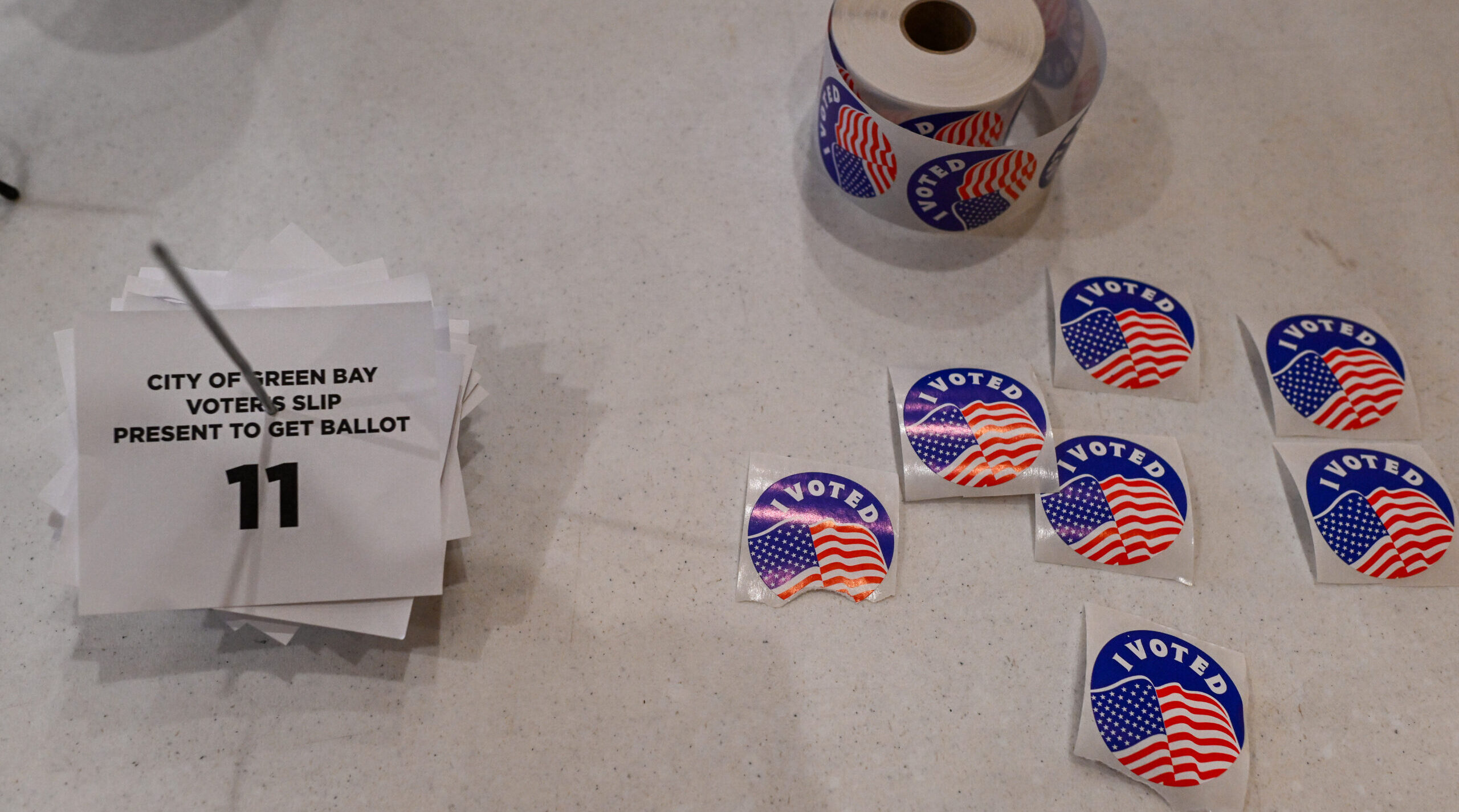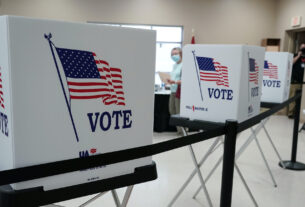WASHINGTON — A poll commissioned by a Jewish affiliate of the Democratic Party shows Vice President Kamala Harris garnering 71% of the Jewish vote in the seven swing states likely to decide the election.
The poll released Wednesday by the Jewish Democratic Council of America and conducted from Sept. 26-Oct. 2 showed Donald Trump getting 26% of the vote just four weeks before the Nov. 5 presidential election. The states include Pennsylvania, Michigan, Wisconsin, Arizona, Georgia, North Carolina, and Nevada.
The polling by GBAO, a company that polls for liberal and Democratic groups, is consistent with a national poll of Jewish voters last month also commissioned by JDCA and carried out by GBAO. That poll showed Harris leading Trump among Jews 68%-25%, and 72% to 25% in a head-to-head race. Jews have historically voted in large majorities for the Democratic presidential candidate.
A large proportion of Jews live in states that are not considered battlegrounds — such as the Democratic strongholds of New York, California, New Jersey and Illinois, or Florida, which is expected to vote Republican — and as such are not expected to determine which candidate gets their state’s electoral votes. This latest poll — by honing in on the swing states of Nevada, Arizona, North Carolina, Georgia, Wisconsin, Michigan and Pennsylvania — makes the case that Jewish voters could help deliver the election to Harris.
“In the states that will decide the outcome of this election, Jewish Americans are strongly motivated to vote – and the vast majority are planning to vote for Kamala Harris,” said Halie Soifer, the JDCA CEO.
The poll also runs up against claims by Jewish Republicans that Jews in the swing states are due to vote in higher numbers for Trump. At the Republican Jewish Coalition’s convention in September, CEO Matt Brooks said the group had data showing almost half of Jewish voters in swing states would vote for Trump. A poll by the Orthodox Union also showed a closer race for the Jewish vote in the crucial swing state of Pennsylvania.
According to the Democratic poll, Jewish voters in the Sun Belt states — Nevada, Arizona, North Carolina and Georgia — skewed older and more conservative than Jewish voters in Wisconsin, Michigan and Pennsylvania, said GBAO’s principal, Jim Gerstein, in an interview.
Still, he said, the tendency to favor Harris over Trump was consistent across the states and was good news for Democrats.
“Trump is as hated in the battleground states as he is hated in the general population among Jewish voters,” Gerstein said.
Also consistent, according to the poll, is how respondents do not view Israel as their top issue at the ballot box. It ranked fourth among issues presented to the respondents, with 16% saying it was their top issue — though that was higher than the national poll of Jews, who ranked it ninth. Ahead of Israel in the poll of swing state Jews was the future of democracy, which 44% of respondents view as their top issue; abortion which garnered 36%, and inflation and the economy, which garnered 24%.
Despite Democrats’ historic advantage among Jews, Republicans believe that the domestic turmoil and spike in antisemitism unleashed last year by Hamas’ invasion of Israel — including at protests against Israel’s conduct in progressive redoubts such as college campuses, will erode Jewish support for Harris. Republicans also point to increased calls among some progressive Democrats to cut defense spending to Israel.
Trump has said he has seen polling that would garner him 40% of the Jewish vote, around 10 points more than recent Republican candidates have typically received, although he did not cite the specific polls. He also has said 40% is not enough — he wants 100% — and said that “the Jewish people” will be to blame if he is not elected.
Jewish Democrats say that such warnings and Trump’s repeated claims that Jewish Democrats ought to have their “head examined” are antisemitic. A JDCA ad released Tuesday shows a young Jewish woman having her “head examined” — and then outlining why she would never vote for him.
Another poll of Jewish voters showed a more favorable result for Republicans. A study carried out in late July and early August for the Orthodox Union’s Teach Coalition found that among Pennsylvania Jewish voters, Harris’ lead was 52% to Trump’s 41%, a considerably narrower gap than the 65%-70% Jewish voters traditionally deliver to Democratic nominees.
Bradley Homan, CEO of the Honan Strategy Group, which carried out the poll for the Orthodox Union, said he was seeing a shift among Jewish voters that could help deliver a Trump win in Pennsylvania, where there are more than 300,000 likely Jewish voters, and which Trump lost by just over 80,000 votes in 2020.
“We saw this as potentially a significant realignment of the voting coalition that we’re not seeing with any other Democratic demographic in American politics,” Homan said in an interview.
The two polls employed different methodologies: The JDCA weighted its poll according to data by the Pew Research Center that breaks down the percentage of Jewish Americans according to their affiliation — or non-affiliation — with the various religious streams, as well as age and gender. The Orthodox Union poll was not weighted.
The JDCA poll reached 800 voters by text across the seven states, while the O.U. poll reached 400 voters in Pennsylvania by phone. Both polls had a margin of error of approximately 3.5%.
Soifer said she was confident Jewish voters would stay the course with Democrats.
“The Jewish American electorate has been incredibly consistent in its overwhelming rejection of Donald Trump,” she said. “This poll demonstrates that 2024 is no different and that Donald Trump – who received 25% of the Jewish vote in 2016 – has made zero inroads with Jewish voters in the past eight years.”
Support the Jewish Telegraphic Agency
Help ensure Jewish news remains accessible to all. Your donation to the Jewish Telegraphic Agency powers the trusted journalism that has connected Jewish communities worldwide for more than 100 years. With your help, (JEWISH REVIEW) can continue to deliver vital news and insights. Donate today.




